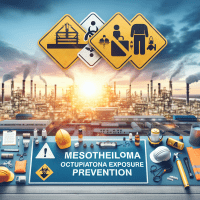Mesothelioma Awareness Day Facts: A Journey of Compassion and Hope
Hi there, I’m a registered nurse with over a decade of experience in oncology, and I understand the emotional journey that comes with a mesothelioma diagnosis. Today, I share with you Mesothelioma Awareness Day facts, not only to inform you of critical medical insights but also to offer a guiding hand through a deeply personal, challenging time. In this blog post, I want to walk with you – providing valuable information, practical advice, and heartfelt support, every step of the way.

Understanding Mesothelioma and Its Impact
Mesothelioma is a rare and aggressive cancer, most commonly associated with asbestos exposure. On Mesothelioma Awareness Day, we come together not only to raise awareness but to remember those affected, learn the facts, and discuss the latest updates in treatment and supportive care. I share these facts with empathy, knowing that every statistic represents a life and every fact holds a story.

The Medical Facts: Diagnosis, Staging, and Treatment Options
I believe understanding is the first step to empowerment. Let’s walk through some key medical aspects of mesothelioma together:
Diagnosis and Biopsy Procedures
Diagnosis typically involves imaging tests such as X-rays, CT scans, and MRIs, followed by a biopsy of the affected tissue. Common biopsy procedures include:
- Thoracoscopy: A minimally invasive procedure where a small camera and instruments are inserted into the chest to collect tissue samples.
- Thoracentesis: A procedure used to remove fluid from the pleural space, which can then be analyzed for cancer cells.
Knowing these facts can help reduce anxiety around the diagnostic process. I encourage you to ask your healthcare team any questions about which procedure is best for your situation.
Understanding the Stages of Mesothelioma
Mesothelioma is typically staged from 1 to 4, with Stage 1 representing early detection and Stage 4 indicating advanced disease. Here is a simple table to illustrate the stages:
| Stage | Description |
|---|---|
| Stage 1 | Localized cancer, more treatment options, better prognosis. |
| Stage 2 | Cancer has spread to nearby tissues; treatment becomes more complex. |
| Stage 3 | Significant local spread; treatment focuses on quality of life and symptom management. |
| Stage 4 | Advanced spread; treatment aims to provide comfort and supportive care. |
Treatment Options and How They Work
Treatment pathways for mesothelioma may include surgery, chemotherapy, and radiation therapy. In some cases, immunotherapy and clinical trials are available options. Each treatment aims to either remove or slow the growth of the tumor, relieve symptoms, and improve quality of life.
Emotional and Practical Support for Patients and Families
When facing a diagnosis like mesothelioma, the emotional toll can be overwhelming. I truly believe that you are not alone on this journey. Here are some strategies and resources that have helped me and many others cope during difficult times:
Coping with Anxiety, Fear, and Grief
- Seeking Mental Health Support: Consider joining a support group or speaking with a mental health professional who understands mesothelioma. The connection with others who are experiencing similar challenges can provide immense comfort.
- Mindfulness and Relaxation Techniques: Simple mindfulness exercises, such as deep-breathing or guided meditation (many local hospitals and community centers offer these sessions), can help manage anxiety and fear.
- Open Conversations with Loved Ones: Sharing your thoughts and feelings with family and friends often lightens the burden. Communication is crucial, whether it’s about treatment options or the emotional impact of the diagnosis.
Practical Steps to Enhance Quality of Life
Living with mesothelioma means adjusting to a new reality. I often suggest the following practical measures:
- Maintaining a balanced diet and regular exercise routine as tolerated.
- Engaging in supportive counseling or therapy, either individually or with loved ones.
- Joining online communities or local groups that focus on mesothelioma support. You can also visit our Mesothelioma Support Resources page.

A Personal Reflection: From My Heart to Yours
A Personal Reflection: In my years in oncology, I’ve seen the fears, hopes, and immense strength in my patients. I want you to know that every step you take, every question you ask, is a testament to your courage. I share this information not just to inform but to offer a compassionate hand. Together, we can navigate this challenging path with understanding and mutual support.
Empowering Yourself with Information
Knowledge is empowering. On this Mesothelioma Awareness Day, I encourage you to explore further by reaching out to organizations like the National Cancer Institute or the American Cancer Society, which offer updated guides and expert advice.
Understanding Your Medical Options
Consider making a list of questions to ask your healthcare provider, such as:
- What type of mesothelioma is it, and what is my stage?
- What treatment options are available, and what are the potential side effects?
- How can I access mental health support during treatment?
These questions can spark a dialogue that helps you feel more in control of your healthcare decisions. If you’d like to know more about specific diagnostic methods, check out our detailed post on Understanding Mesothelioma Diagnosis.
Integrating Care: Medical, Emotional, and Community Support
A key part of managing mesothelioma is knowing that you have a network of resources available. Alongside treatment, I strongly encourage you to explore community support groups, both online and locally. Each resource is designed to provide practical advice, emotional support, and a sense of not being alone.
Looking Ahead: Next Steps on Your Journey
As you digest this information, remember that it’s okay to feel overwhelmed. Your next steps might include:
- Scheduling an appointment with a mesothelioma specialist to review your treatment options.
- Joining a support group where you can share experiences and learn coping strategies.
- Reviewing the information from trusted sources like the National Cancer Institute for updated treatment guidelines (current as of May 2025).
Final Thoughts
In closing, please remember that while mesothelioma is a daunting diagnosis, you have communities and resources devoted to helping you face these challenges. I am here as a guide and companion, committed to offering empathetic support and actionable information. Our transparent approach means that while we may mention additional resources—such as links to legal or financial aid—they are always secondary to the genuine care and community support you deserve.
Words of Encouragement I’ve Found Helpful
Remember, you are stronger than you think, and every day brings a new opportunity to find light in the darkness. Keep reaching out, keep asking questions, and know that my heart is with you on this journey.
If you’re searching for more insights on coping with mesothelioma or need personalized guidance, please visit our related post on Mesothelioma Treatment Options and other resources available on our site.
Disclaimer: The content provided here is intended for informational and supportive purposes only and should not be considered as a substitute for professional medical advice. Always consult with your healthcare provider regarding any medical concerns.






